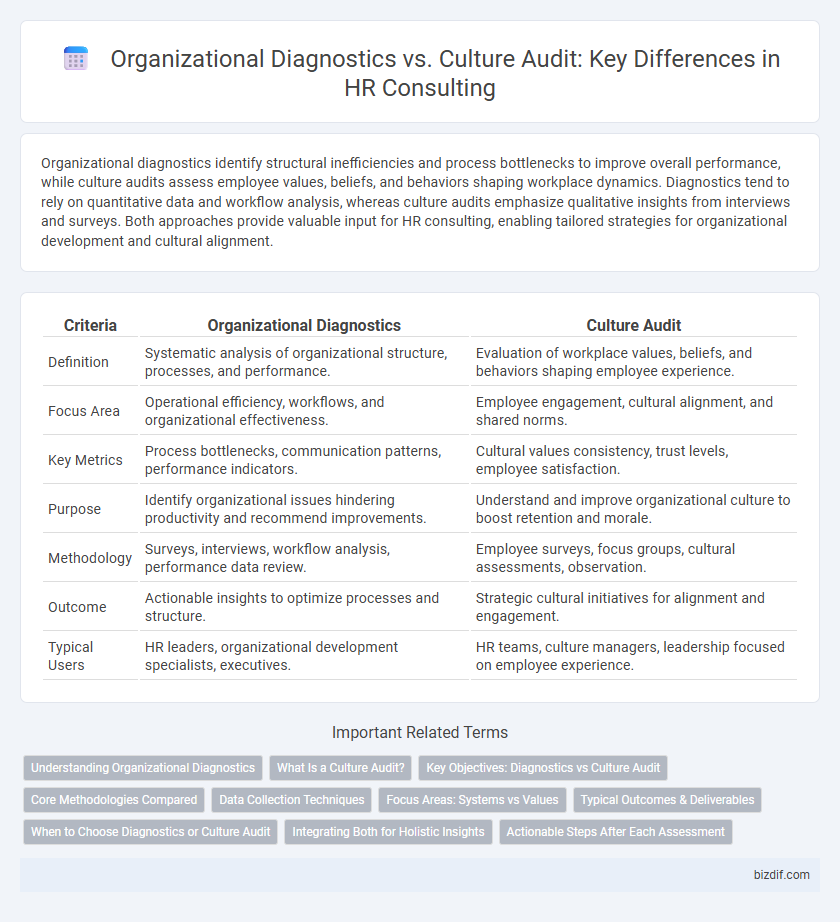Organizational diagnostics identify structural inefficiencies and process bottlenecks to improve overall performance, while culture audits assess employee values, beliefs, and behaviors shaping workplace dynamics. Diagnostics tend to rely on quantitative data and workflow analysis, whereas culture audits emphasize qualitative insights from interviews and surveys. Both approaches provide valuable input for HR consulting, enabling tailored strategies for organizational development and cultural alignment.
Table of Comparison
| Criteria | Organizational Diagnostics | Culture Audit |
|---|---|---|
| Definition | Systematic analysis of organizational structure, processes, and performance. | Evaluation of workplace values, beliefs, and behaviors shaping employee experience. |
| Focus Area | Operational efficiency, workflows, and organizational effectiveness. | Employee engagement, cultural alignment, and shared norms. |
| Key Metrics | Process bottlenecks, communication patterns, performance indicators. | Cultural values consistency, trust levels, employee satisfaction. |
| Purpose | Identify organizational issues hindering productivity and recommend improvements. | Understand and improve organizational culture to boost retention and morale. |
| Methodology | Surveys, interviews, workflow analysis, performance data review. | Employee surveys, focus groups, cultural assessments, observation. |
| Outcome | Actionable insights to optimize processes and structure. | Strategic cultural initiatives for alignment and engagement. |
| Typical Users | HR leaders, organizational development specialists, executives. | HR teams, culture managers, leadership focused on employee experience. |
Understanding Organizational Diagnostics
Organizational diagnostics involves a comprehensive assessment of a company's internal processes, structures, and workflows to identify inefficiencies and areas for improvement. This approach uses quantitative data, employee feedback, and performance metrics to analyze organizational health and drive strategic decision-making. Unlike culture audits, which primarily evaluate values and behaviors, organizational diagnostics offers a broader perspective on operational effectiveness and alignment with business goals.
What Is a Culture Audit?
A Culture Audit is a systematic evaluation of an organization's values, beliefs, behaviors, and internal environment to assess alignment with business goals and employee engagement. It identifies cultural strengths and areas for improvement by using surveys, interviews, and data analysis to reveal how culture impacts performance and retention. Organizational Diagnostics differs by providing a broader assessment of overall organizational health, including structure, processes, and systems beyond just culture.
Key Objectives: Diagnostics vs Culture Audit
Organizational diagnostics focus on identifying structural inefficiencies, workflow bottlenecks, and communication breakdowns to optimize overall performance. Culture audits assess employee values, behaviors, and engagement levels to align workplace culture with strategic goals. Both methods provide critical insights but target different aspects: diagnostics improve operational effectiveness while culture audits enhance employee experience and retention.
Core Methodologies Compared
Organizational diagnostics employ quantitative data analysis and performance metrics to identify structural inefficiencies and workflow bottlenecks within a company. Culture audits utilize qualitative methods such as employee surveys, focus groups, and ethnographic observation to assess values, beliefs, and behavioral norms shaping workplace climate. Core methodologies differ in their focus: organizational diagnostics center on operational effectiveness, while culture audits emphasize employee experience and alignment with corporate values.
Data Collection Techniques
Organizational diagnostics primarily utilize quantitative data collection techniques such as surveys, performance metrics, and workflow analysis to identify systemic issues within processes and structures. Culture audits emphasize qualitative methods including focus groups, ethnographic observations, and in-depth interviews to uncover underlying values, beliefs, and employee sentiments. Combining these approaches provides a comprehensive view of both operational efficiency and organizational climate.
Focus Areas: Systems vs Values
Organizational diagnostics concentrate on evaluating systems, processes, and structural efficiencies within a company to identify operational bottlenecks and performance gaps. In contrast, culture audits delve into values, beliefs, and behavioral norms that shape employee engagement and organizational identity. Understanding these focus areas helps HR consultants tailor interventions that align systemic improvements with cultural transformation initiatives.
Typical Outcomes & Deliverables
Organizational diagnostics deliver comprehensive insights into structural efficiencies, workflow bottlenecks, and performance metrics, enabling targeted process improvements and strategic realignments. Culture audits provide in-depth assessments of employee values, behavioral norms, and engagement levels, resulting in actionable recommendations for enhancing workplace morale and alignment with organizational vision. Typical deliverables include diagnostic reports, cultural assessment summaries, gap analyses, and tailored intervention plans to support sustainable organizational development.
When to Choose Diagnostics or Culture Audit
Organizational diagnostics should be chosen when identifying structural inefficiencies, workflow bottlenecks, and leadership effectiveness to improve operational performance. Culture audits are more appropriate for assessing employee values, engagement levels, and workplace environment to align organizational behaviors with strategic goals. Selecting between these tools depends on whether the priority is diagnosing systemic issues or understanding the underlying cultural dynamics.
Integrating Both for Holistic Insights
Organizational diagnostics assess structural efficiency, processes, and performance metrics, while culture audits evaluate employee values, beliefs, and interpersonal dynamics. Integrating both approaches provides a comprehensive understanding of how organizational systems and cultural elements influence overall effectiveness. This holistic insight enables HR consultants to design targeted interventions that align operational improvements with cultural transformation.
Actionable Steps After Each Assessment
Organizational Diagnostics identify structural inefficiencies and process bottlenecks, enabling targeted interventions like workflow reengineering and resource realignment. Culture Audits assess employee values, engagement, and communication patterns, guiding initiatives such as leadership training and cultural alignment programs. Both assessments lead to actionable steps that enhance organizational performance and employee satisfaction.
Organizational Diagnostics vs Culture Audit Infographic

 bizdif.com
bizdif.com